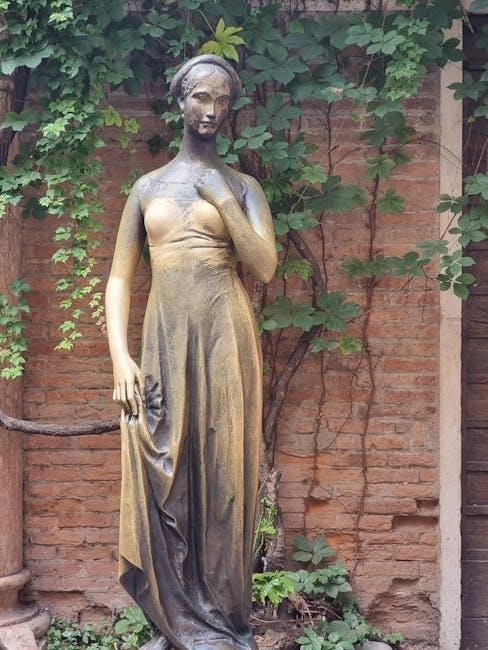Exploring Romeo and Juliet’s characters reveals their complexities‚ motivations‚ and growth. The play’s tragic outcome is deeply rooted in their personalities and the societal conflicts they face.
1.1 Overview of the Play and Its Themes
Romeo and Juliet‚ a timeless tragedy by William Shakespeare‚ revolves around the intense feud between the Montagues and Capulets in Verona. The play explores universal themes such as love‚ fate‚ loyalty‚ and conflict. Romeo’s initial obsession with Rosaline contrasts with his profound love for Juliet‚ highlighting his emotional journey. Juliet evolves from innocence to independence‚ defying societal expectations. Their tragic end underscores the futility of hatred and the devastating consequences of impulsive decisions. The play’s enduring relevance lies in its profound portrayal of human emotions and the destructive nature of unresolved conflicts. Themes of love and fate intertwine to shape the characters’ destinies and the play’s heartbreaking conclusion.
1.2 Importance of Character Analysis in Understanding the Play
Character analysis is crucial for understanding Romeo and Juliet‚ as it reveals the motivations and emotional depths of the characters. By examining Romeo’s impulsive nature and Juliet’s growth from naivety to independence‚ readers gain insight into their decisions. Supporting characters like Friar Laurence and the Nurse influence the plot’s trajectory‚ while the feud between the Montagues and Capulets underscores the societal tensions. Analyzing these elements highlights how Shakespeare uses characters to explore themes of love‚ fate‚ and conflict. This depth enriches the play’s interpretation‚ making it a timeless study of human behavior and emotions.

Major Characters in Romeo and Juliet
Romeo‚ a passionate and emotional young man‚ and Juliet‚ a naive yet determined girl‚ drive the story with their tragic love‚ exploring themes of love and fate.
2.1 Romeo Montague: His Personality‚ Motivations‚ and Development
Romeo‚ the passionate and impulsive son of the Montagues‚ is driven by intense emotions and a deep sense of love. Initially heartbroken over Rosaline‚ he quickly becomes smitten with Juliet‚ showcasing his romantic and idealistic nature. His impulsive decisions‚ such as secretly marrying Juliet and killing Tybalt‚ highlight his tendency to act without forethought. Throughout the play‚ Romeo evolves from a lovesick teenager to a tragic hero‚ willing to sacrifice everything for his love. His development is marked by a shift from emotional instability to a profound understanding of love’s consequences.
2.2 Juliet Capulet: Her Growth from Naivety to Independence
Juliet evolves from a naive‚ sheltered girl to a determined‚ independent individual. Initially‚ she obeys her parents‚ reflecting her innocence and societal expectations. However‚ upon meeting Romeo‚ she begins to assert her own desires‚ defying her family by secretly marrying him. Her decision to fake her death to avoid another marriage showcases her growing independence. Juliet’s journey from a subordinate role to a self-determined individual highlights her strength. Her tragic end underscores her ultimate sacrifice for love‚ demonstrating her transformation from a naive girl to a woman willing to take control of her fate‚ despite the devastating consequences.

Supporting Characters and Their Roles
Supporting characters like Tybalt‚ Friar Laurence‚ and the Nurse play pivotal roles in shaping the plot and influencing Romeo and Juliet’s decisions‚ adding depth to the tragedy.
3.1 Tybalt: The Catalyst for Conflict and Tragedy
Tybalt‚ Juliet’s cousin‚ is a fiery and aggressive character whose hatred for the Montagues drives much of the play’s conflict. His impulsive nature and desire for revenge lead to the death of Mercutio‚ prompting Romeo’s banishment. Tybalt’s actions escalate tensions‚ making him a central figure in the tragic unraveling of events. His death at Romeo’s hands further intensifies the families’ feud and seals Juliet’s fate‚ highlighting his role as a catalyst for the play’s devastating outcome.
3.2 Friar Laurence: The Well-Meaning Mentor with Tragic Flaws
Friar Laurence‚ a wise and compassionate mentor‚ plays a pivotal role in Romeo and Juliet’s lives. His intention to end the feud through their union is noble‚ but his plans are flawed. The potion he gives Juliet‚ meant to deceive her family‚ ultimately leads to tragic misunderstandings. His failure to communicate effectively with Romeo about Juliet’s fake death results in Romeo’s impulsive actions. Despite his good intentions‚ Friar Laurence’s miscalculations contribute to the play’s tragic conclusion‚ illustrating how even well-meaning actions can lead to devastating consequences.
3.3 The Nurse: Juliet’s Confidante and Emotional Support
The Nurse is Juliet’s loyal confidante‚ providing emotional support and wisdom. Having nurtured Juliet since childhood‚ she shares a deep bond with her‚ offering advice and comfort. Her humorous yet insightful nature makes her a relatable character. However‚ her eventual betrayal of Juliet’s trust‚ by encouraging marriage to Paris‚ highlights her own conflict between loyalty and obedience to the Capulets. The Nurse’s well-meaning but flawed guidance underscores the challenges Juliet faces in navigating her family’s expectations and her own desires‚ making her a crucial yet tragic figure in Juliet’s journey.

The Families and Their Influence
The feuding Montagues and Capulets shape the play’s tragic trajectory. Their pride and hatred drive the characters’ actions‚ leading to inevitable conflict and ultimately‚ the lovers’ doomed fate.
4.1 Lord and Lady Capulet: Authority‚ Expectations‚ and Family Pride
Lord and Lady Capulet embody rigid family pride and societal expectations. They demand unwavering loyalty from Juliet‚ enforcing their will through authority and emotional manipulation. Their refusal to accept Romeo‚ a Montague‚ reflects the deep-seated feud. Lady Capulet‚ though emotionally distant‚ aligns with her husband’s decisions‚ prioritizing family honor over Juliet’s happiness. Lord Capulet’s enraged response to Juliet’s defiance highlights his authoritarian nature. Together‚ they represent the oppressive force driving Juliet to desperate choices‚ ultimately contributing to the tragic outcome. Their actions underscore the destructive power of pride and adherence to societal norms in Verona’s tense environment.
4.2 Lord and Lady Montague: The Other Side of the Feud
Lord and Lady Montague‚ as Romeo’s parents‚ are overshadowed by the family feud with the Capulets. While less prominent‚ they exhibit concern for Romeo’s well-being‚ particularly his melancholy over Rosaline. Lady Montague shows maternal care‚ worrying about her son’s emotional state. Lord Montague‚ though authoritative‚ seeks peace‚ urging Romeo to avoid confrontations. Their roles‚ while not central‚ highlight the familial tensions and the broader societal divide. Unlike the Capulets‚ they appear more empathetic‚ yet their influence is limited in altering Romeo’s impulsive decisions‚ thus indirectly contributing to the tragic events shaped by the feud.

Key Relationships and Dynamics
The central conflict between the Montagues and Capulets fuels the tragic events. Romeo and Juliet’s forbidden love becomes the emotional core‚ while their friendships with Mercutio‚ Benvolio‚ and the Nurse provide depth. Friar Laurence’s mentorship and the families’ expectations further complicate their choices. Societal pressures and impulsive decisions drive the characters toward their doomed fate‚ highlighting the destructive nature of unchecked emotions and unresolved conflicts.
5.1 The Rivalry Between the Montagues and Capulets
The rivalry between the Montagues and Capulets is a central theme in Romeo and Juliet‚ driving the play’s tragic events. This ancient feud‚ rooted in pride and hatred‚ escalates tensions in Verona‚ creating a volatile environment. The families’ animosity leads to impulsive decisions‚ such as Tybalt’s aggression toward Romeo‚ and ultimately seals the lovers’ fate. The societal expectation to uphold family honor traps the characters in a cycle of revenge and violence. This bitter rivalry not only divides the city but also highlights the destructive power of unchecked emotions and long-standing grudges.
5.2 Romeo and Juliet’s Love: Its Depth and Consequences
Romeo and Juliet’s love is profound and all-consuming‚ transcending the bitter feud between their families. Their bond evolves from an impulsive attraction to a deep emotional connection‚ as seen in their balcony scene and secret marriage. However‚ their love’s intensity also leads to tragic consequences. Impulsive decisions‚ such as Romeo’s rash murder of Tybalt and Juliet’s desperate plan to fake her death‚ illustrate the destructive power of their passion. Their ultimate sacrifice underscores the devastating cost of their families’ hatred and the redemptive power of their love‚ leaving a lasting impact on Verona and future generations.
Minor but Impactful Characters
Minor characters like Mercutio‚ Benvolio‚ Paris‚ Prince Escalus‚ and Rosaline play pivotal roles‚ shaping the plot and highlighting themes of loyalty‚ duty‚ and tragic fate.
6.1 Mercutio: Romeo’s Friend and the Spark of Conflict
Mercutio‚ Romeo’s vibrant friend‚ embodies wit and fiery passion. His tragic death escalates the conflict‚ igniting a cycle of revenge and sealing the lovers’ fate. His loyalty and humor contrast sharply with the play’s darkness‚ making his loss deeply felt. Mercutio’s character serves as a catalyst‚ pushing Romeo into actions with irreversible consequences‚ thus highlighting the devastating impact of impulsive behavior and the senseless violence that fuels Verona’s tragic tale.
6.2 Benvolio: The Voice of Reason in a Chaotic World
Benvolio‚ Romeo’s cousin‚ stands out as the voice of reason amidst Verona’s turmoil. His calm and composed nature contrasts with the impulsive behavior of those around him‚ making him a stabilizing force. Benvolio often acts as a mediator‚ attempting to defuse tensions‚ particularly between Romeo and Tybalt. Despite his efforts‚ he is ultimately unable to prevent the tragic events from unfolding. His loyalty to Romeo and his level-headed approach make him a sympathetic character‚ highlighting the futility of violence and the importance of restraint in a world driven by passion and conflict.
6.3 Paris: The Unfortunate Suitor and Symbol of Duty
Paris‚ a wealthy and respected suitor‚ represents duty and societal expectations in Verona. Engaged to Juliet through an arranged marriage‚ he embodies the traditional norms of the Capulet family. Despite his genuine affection for Juliet‚ he lacks the passion and connection she shares with Romeo. Paris’s character underscores the conflict between duty and personal desire‚ as he adheres to his obligations even when faced with Juliet’s resistance. His untimely death in the tomb alongside Romeo and Juliet further emphasizes the tragic consequences of a society prioritizing duty over love and individual choice.
6.4 Prince Escalus: The Authority Trying to Maintain Order
Prince Escalus‚ as the ruler of Verona‚ strives to maintain peace and order amid the feuding families. His authority is firm‚ yet his efforts are often undermined by the deep-seated hatred between the Montagues and Capulets. Escalus imposes harsh penalties to curb the violence‚ yet his interventions prove insufficient to stop the tragic cycle. His character symbolizes the struggle for control in a chaotic world. Ultimately‚ his death in the tomb serves as a poignant reminder of the futility of authority in the face of relentless conflict and fate‚ leaving Verona to mourn the loss of its leader. His role is both symbolic and tragic.
6.5 Rosaline: The Forgotten Love and Romeo’s Initial Obsession
Rosaline‚ though never appearing on stage‚ plays a crucial role in Romeo’s emotional journey. She is the object of his initial infatuation‚ embodying the idealized love common in Petrarchan sonnets. Romeo’s devotion to her is intense but unrequited‚ leaving him heartbroken and emotionally vulnerable. His obsession with Rosaline highlights his romantic and impulsive nature‚ setting the stage for his later passion for Juliet. Rosaline’s absence from the main narrative underscores her role as a catalyst for Romeo’s development‚ illustrating how unattainable love shapes his identity and leads him to seek fulfillment elsewhere‚ ultimately contributing to the tragic events of the play.



